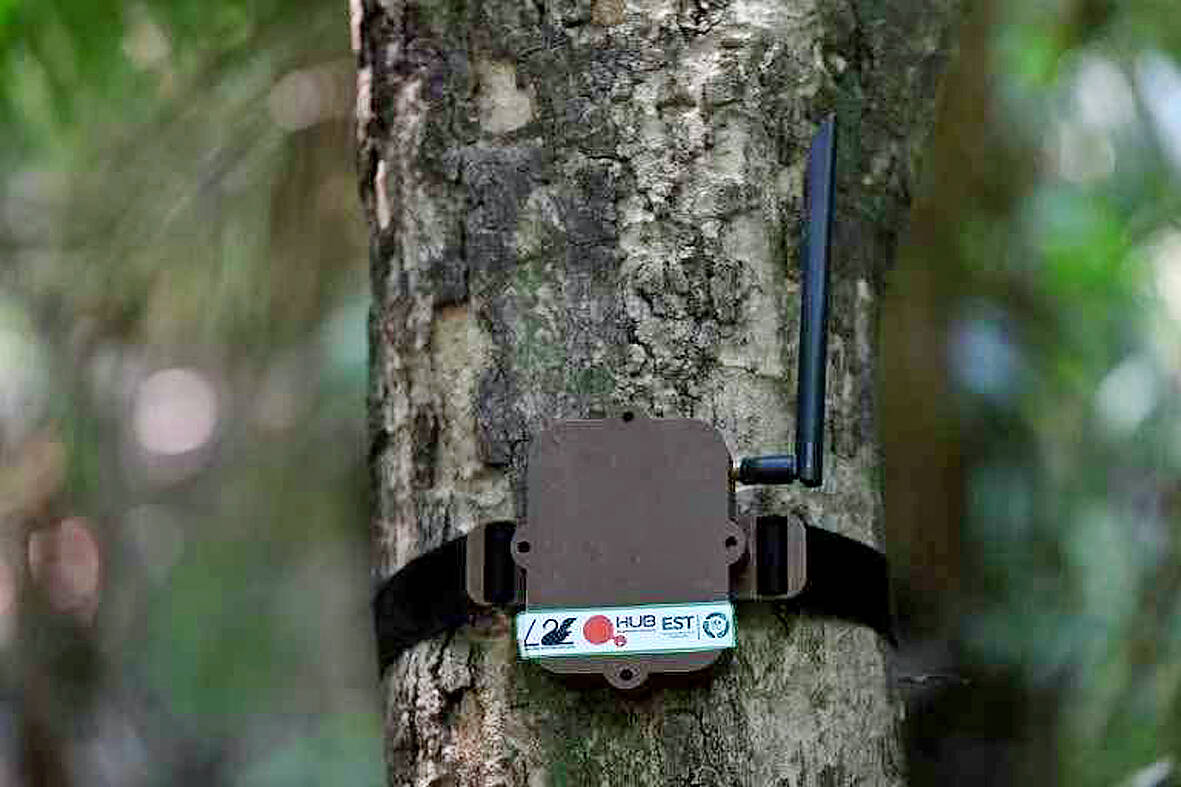Small computers tied to tree trunks in the Brazilian Amazon are the latest weapon in the arsenal of scientists and environmentalists battling destructive jungle invaders.
The boxes, named “curupiras” after a folkloric forest creature that preys on hunters and poachers, sport sensors and software “to recognize the sounds of chainsaws and tractors, or anything that could cause deforestation,” project manager Thiago Almeida told reporters.
“We recorded the sound of chainsaws and tractors in the forest ... then, all the collected sounds were passed on to the AI [artificial intelligence] team to train [the program] so that ... it would only recognize these sounds and not the characteristic sounds of the forest, such as animals, vegetation and rain,” Almeida said.

PHOTO: AFP
Once identified, details of the threat can then be relayed to a central point and agents deployed to deal with it.
“The advantage of this system is that it can detect an attack ... or a threat in real time,” said researcher Raimundo Claudio Gomes of Amazonas State University, which is behind the project.
Unlike satellite data, which reveal deforestation only after the fact, the curupiras can detect “when the destruction starts,” Gomes said.
The sensors look like small Internet modems, but are in fact wireless and can relay data up to 1km via satellite to others in a network.
The project has just completed its pilot phase with 10 prototype boxes fixed to trees in a densely forested area near Manaus, the capital of Amazonas state.
Early results from the project, financed by Brazilian company Hana Electronics, have been “very promising,” Gomes said.
The team is now looking for more funding to add hundreds more sensors to the system, including ones that will be able to detect smoke and heat from forest fires.
Gomes said that unlike audio sensor-based systems already used in other countries, the Manaus project is comparatively inexpensive, as it does not require large antennas for data transmission.
Each sensor costs about US$200 to US$300 to manufacture.

OPTIMISTIC: A Philippine Air Force spokeswoman said the military believed the crew were safe and were hopeful that they and the jet would be recovered A Philippine Air Force FA-50 jet and its two-person crew are missing after flying in support of ground forces fighting communist rebels in the southern Mindanao region, a military official said yesterday. Philippine Air Force spokeswoman Colonel Consuelo Castillo said the jet was flying “over land” on the way to its target area when it went missing during a “tactical night operation in support of our ground troops.” While she declined to provide mission specifics, Philippine Army spokesman Colonel Louie Dema-ala confirmed that the missing FA-50 was part of a squadron sent “to provide air support” to troops fighting communist rebels in

ANGER: A video shared online showed residents in a neighborhood confronting the national security minister, attempting to drag her toward floodwaters Argentina’s port city of Bahia Blanca has been “destroyed” after being pummeled by a year’s worth of rain in a matter of hours, killing 13 and driving hundreds from their homes, authorities said on Saturday. Two young girls — reportedly aged four and one — were missing after possibly being swept away by floodwaters in the wake of Friday’s storm. The deluge left hospital rooms underwater, turned neighborhoods into islands and cut electricity to swaths of the city. Argentine Minister of National Security Patricia Bullrich said Bahia Blanca was “destroyed.” The death toll rose to 13 on Saturday, up from 10 on Friday, authorities

Two daughters of an Argentine mountaineer who died on an icy peak 40 years ago have retrieved his backpack from the spot — finding camera film inside that allowed them a glimpse of some of his final experiences. Guillermo Vieiro was 44 when he died in 1985 — as did his climbing partner — while descending Argentina’s Tupungato lava dome, one of the highest peaks in the Americas. Last year, his backpack was spotted on a slope by mountaineer Gabriela Cavallaro, who examined it and contacted Vieiro’s daughters Guadalupe, 40, and Azul, 44. Last month, the three set out with four other guides

ECONOMIC DISTORTION? The US commerce secretary’s remarks echoed Elon Musk’s arguments that spending by the government does not create value for the economy US Secretary of Commerce Howard Lutnick on Sunday said that government spending could be separated from GDP reports, in response to questions about whether the spending cuts pushed by Elon Musk’s Department of Government Efficiency could possibly cause an economic downturn. “You know that governments historically have messed with GDP,” Lutnick said on Fox News Channel’s Sunday Morning Futures. “They count government spending as part of GDP. So I’m going to separate those two and make it transparent.” Doing so could potentially complicate or distort a fundamental measure of the US economy’s health. Government spending is traditionally included in the GDP because